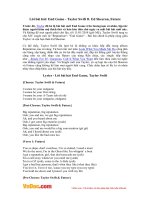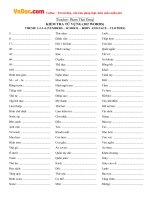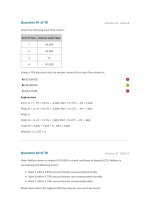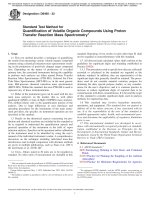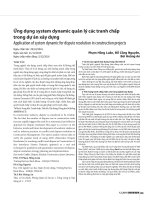END OF UNIT TEST 1
Bạn đang xem bản rút gọn của tài liệu. Xem và tải ngay bản đầy đủ của tài liệu tại đây (41.17 KB, 4 trang )
University of Economics, HCMC
School of Foreign Languages
End of Unit Test.U27.M4
Name: …………………………
EXAM IN ENGLISH FOR BUSINESS COMMUNICATION (30 minutes)
I.
Match up the half-sentences below defining key terms.
1. Protectionism means restricting imports …
A. a tax charged on imports.
2. An infant industry is one that is …
B. by way of trade barriers such as tariffs and
quotas.
3. Absolute advantage means a country’s ability C. government policies or regulations that
to …
4. Comparative advantage means a country’s
restrict international trade.
D. a maximum quantity of goods of a specific
ability to …
5. A quota is …
kind that can be imported into a country.
E. in an early stage of development and which
cannot survive competition from foreign
6. A tariff is …
companies.
F. particularly important to a country’s
7. Trade barriers are …
economy.
G. produce goods at a lower cost than any other
8. Free trade means imports and exports of
country.
H. produce particular goods more
goods and services …
efficiently (using fewer resources and at a
lower cost) than some other countries.
9. A strategic industry is one that is …
I. involved in moving a product or service from
10. Supply chain is a system of organizations,
supplier to customer.
J. without any government restrictions.
people, activities, information, and resources
II.
1. make
Match one item from A with one from B to make a common collocation
a. of achieving the targets
1
2. capable
b. for sure
3. turn out
c. in stock and share
4. take
d. to the pressures of foreign markets
5. know
e. job opportunities
6. invest
f. to be a disaster
7. increase
g. the productivity
8. expose themselves
h. into risky ventures
9. create
i. a risk
10. get
j. a living
III.
Complete the sentences with one of the words in the following box
protectionism
stimulate
high-risk
efficiency gains
analogy
inferior
expose
inefficient
stability
intellectual property
1. While there are several investment plans, one can choose ………………. investment options if
they are willing to take risks.
2. You might call something ………………. if its quality is not as good as another.
3. ………………. management may come from the leader’s individual personality.
4. A raise in employee wages can ………………. production.
5. If cost goes down and earnings are flat, or if cost is flat but earnings go up, the company has
made ……………….
6. There will be a lot of competitive and strong companies coming here and even though Kosovo is
a small company, one of our main interest is to ………………. it to the world market.
7. Australia’s Treasurer, Wayne Swan, used the ………………. of Hurricane Katrina to convince
his audience that through crisis came a better understanding of underlying weaknesses in a system.
8. Trade ………………. is how countries raise tariffs and reduce imports to protect their domestic
industries.
9. On April 26 every year we celebrate World ………………. Day to promote discussion of the role
of IP in encouraging innovation and creativity.
10. The manager’s first task is to bring some ………………. to the team.
IV.
Listen to the recordings and fill in the blanks with the words you hear.
2
I think I would argue that many economists favour (1) ………..
…………, and some
governments see the problems with free trade, under (2) ……….. …………. We all know that
economics is based on (3) ……….. …………. And sometimes those simplified models are not
useful in explaining the way the (4) ………..
………… works, or sometimes there are
exceptions to those models.
Let’s take into account the (5) ……….. ………… for free trade – OK, that everybody gets (6)
……….. …………, more efficiency, we can consume more goods and services. Well, that may
be the case, but there may be some people who (7) ……….. …………. Take the very simple
argument, we often have two economies with two goods, OK, we simplify and then we extend.
So say we’ve got two economies with two goods. We’ve got a (8) ……….. ………… producing
computers and cloth, and we have an underdeveloped country that’s trying to produce computers
and cloth. OK, and then we say, well actually with free trade you should specialize in what you’re
best at, or least worst at. OK, so under that situation we say, right, to the developed country, you
produce computers, and sell some computers to the developing country, and the developing
country, you focus on cloth, and buy the computers from the developed country, and so on. That’s
our (9) ……….. …………, OK. And we can see that there’s (10) ……….. …………, ultimately
we should be able to get, consume more computers and cloth through that process.
1.free trade
2. certain circumstances
3
3. simplified models
4. real world
5. standard argument
6. better off
7. lose out
8. developed country
9. standard model
10. efficiency gains
Definition of efficiency gain. Normally measured by looking at the relationship between cost and
earnings. If cost goes down and earnings are flat, or if cost is flat but earnings go up, the company
has made gains in efficiency
4
